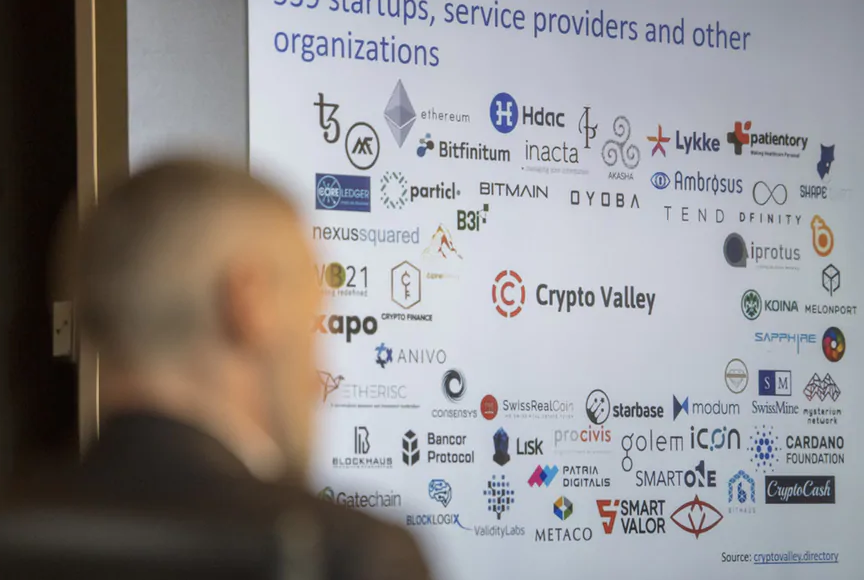
The blockchain sector started in Zug’s Crypto Valley (represented here with a chart of companies), but has spread to other areas of Switzerland. © Keystone / Urs Flueeler
The Swiss blockchain industry appears to be in rude health despite the economic fallout of the coronavirus pandemic. The number of new companies and jobs produced by the sector increased in the first six months of the year. Is this trend set to last?
The number of Crypto Nation (including Liechtenstein) blockchain ventures expanded from 842 at the end of 2019 to 919 in the second half of this year, according to a biannual industry survey. The number of people they hire also increased – from 4,400 to nearly 4,800. There has also been no shortage of private equity funding flowing into companies.
These are the findings of the latest “Top 50” blockchain industry report from Crypto Valley Venture Capital (CV VC), Inacta and PwC Strategy&.
The figures fly in the face warnings in the summer that Covid-19 could seriously damage the sector. The fear was that companies in other sectors would shelve or scrap collaborations with blockchain firms and that venture capitalists would pull up the drawbridge and avoid investing in risky ventures.
Above all, many blockchain start-ups looked certain to fall through the gaps of emergency state bail-out loans because they were not yet generating revenues. Zug, the epicentre of the Swiss blockchain scene, even touted a public-private fund for ailing start-ups, but it never got off the ground.
Has Crypto Nation defied the odds and beaten coronavirus? It’s too early to tell. Far fewer firms have gone bust across all industries so far this year compared to 2019. But this is an artificial state of affairs. The state has provided interest free loans, relief from paying bills, short-time working insurance and has given extra time for firms to sort out their difficulties before declaring insolvency.
The Swiss Creditor Association (debt collection union) predicts the dam to burst in the next few months, leading to an increase of up to 60% in the number of bankruptcies by the end of the year. There is some reason to believe that the blockchain sector will be less affected than the likes of tourism and events management.
Fintech and blockchain are being hailed as the solution to some pandemic induced problems. Digital is tipped to fill the social distancing void. Blockchain could reduce wealth inequality. Bitcoin says is the antidote to central banks debasing currencies with their printing machines.
Some investors have retained faith in blockchain during the crisis. Bitcoin Suisse raised $48 million, 4ART Technologies $45 million, METACO $20 million, Crypto Finance $14 million, Near Protocol $12.1 million and Taurus $8 million. The trick now is converting those millions into a return for investors.
The industry continues to attract former political heavyweights to its ranks. CV VC, which doubles as an incubator for blockchain start-ups, has recruited former German government minister Philipp Rössler to its ranks as advisor, alongside ex-Swiss Economics Minister Johann Schneider-Ammann and former Finnish minister Anne Berner.
But it is almost inevitable that some of the 919 blockchain companies will fail. Some will run out of money before they produce the goods. Others will get their strategy wrong or fail to convince consumers with their technology. There are also suspicions that some projects are alive simply because they raised phenomenal amounts of cash during the ICO goldrush of 2017-2018.
There is another link in the blockchain that needs to fall into place. The technology has been in development for more than a decade but it has yet to break through to mass consumers. There are hopes that law changes approved by Swiss parliament in the last few days will help kickstart the transition from niche alternative to mainstream standard.
Switzerland has become the first major global economy to enact a comprehensive set of legal reforms to smooth the path for blockchain adoption. This could help the country import blockchain projects and companies seeking blockchain solutions. Exporting such services around the world may take more time. Although inroads have been made in Asia and the Middle East, the industry is still waiting for Europe and the US to work out how it will regulate blockchain and crypto assets.
Full story here Are you the author? Previous post See more for Next postTags: Business,Featured,newsletter


























